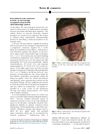 July 2003 in “Journal of Cutaneous Medicine and Surgery”
July 2003 in “Journal of Cutaneous Medicine and Surgery” The document concludes that various treatments for skin conditions are effective, but some require further research, and certain factors like gender and lifestyle can influence disease outcomes.
 July 2003 in “Journal of Cutaneous Medicine and Surgery”
July 2003 in “Journal of Cutaneous Medicine and Surgery” Stopping certain drugs can improve skin conditions, arsenicosis affects over half of a Bangladeshi village, males are more vulnerable, and certain treatments are effective for warts, acne, and psoriasis. Smoking and drinking are linked to psoriasis in men, a cream helps with a type of skin cancer, and low iron levels don't directly cause chronic hair loss in women.
 July 2003 in “Journal of Cutaneous Medicine and Surgery”
July 2003 in “Journal of Cutaneous Medicine and Surgery” High blood pressure drugs often cause skin lupus, stopping the drug usually helps. A vaccine helps prevent genital herpes and HPV-16. More frequent light therapy clears psoriasis faster. No link was found between low iron and chronic hair loss.
[object Object]  July 2003 in “Journal of Cutaneous Medicine and Surgery”
July 2003 in “Journal of Cutaneous Medicine and Surgery” Treating psoriasis with UVB light three times a week is faster than twice a week, and certain medications and lifestyle factors affect psoriasis treatment outcomes.
 July 2003 in “Journal of Cutaneous Medicine and Surgery”
July 2003 in “Journal of Cutaneous Medicine and Surgery” Skin problems are common in Bangladesh due to arsenic, prompt treatment of diabetic foot ulcers is crucial, maternal transmission causes most neonatal herpes, treatments for pediatric vasculitis are effective, the chickenpox vaccine works, more frequent UVB therapy helps psoriasis, certain jobs increase hand dermatitis risk, monoclonal antibodies treat psoriasis well, lifestyle affects psoriasis, alefacept improves psoriasis, imiquimod cream partially clears basal cell carcinoma, and iron may not help chronic hair loss.
July 2021 in “Veterinary record/The veterinary record” A calf in Scotland likely had Schmallenberg virus from its mother.
[object Object]  October 2024 in “Journal of Case Reports in Medical Science”
October 2024 in “Journal of Case Reports in Medical Science” Psychiatric symptoms can be early signs of systemic lupus erythematosus.
 12 citations,
August 2022 in “Biochemical Journal”
12 citations,
August 2022 in “Biochemical Journal” Different types of cell death affect skin health and inflammation, and understanding them could improve treatments for skin diseases.
 July 2018 in “Elsevier eBooks”
July 2018 in “Elsevier eBooks” Telogen Effluvium is a common, usually reversible hair loss condition, often improved by removing the trigger and possibly treated with various products, though their effectiveness is uncertain.
 143 citations,
September 1991 in “Archives of Dermatology”
143 citations,
September 1991 in “Archives of Dermatology” Generalized pustular psoriasis patients often need strong medication and careful treatment due to flare-ups and complications.
 May 2009 in “Medical and surgical dermatology/Medical & surgical dermatology”
May 2009 in “Medical and surgical dermatology/Medical & surgical dermatology” Hair and nail conditions can stabilize or improve over time, and new treatments show promise.
15 citations,
January 1992 in “Dermatology” Artificial hair implants can cause severe skin problems, often needing surgical removal.
 14 citations,
September 2016 in “Journal of Cutaneous Pathology”
14 citations,
September 2016 in “Journal of Cutaneous Pathology” The document concludes that new methods improve the accuracy of diagnosing scalp alopecia and challenges the old way of classifying it.
 16 citations,
March 2017 in “Bone Marrow Transplantation”
16 citations,
March 2017 in “Bone Marrow Transplantation” Some children who had stem cell transplants developed permanent hair loss, especially when treated with a drug called busulphan.
 April 2023 in “Journal of Investigative Dermatology”
April 2023 in “Journal of Investigative Dermatology” Weight loss surgery improved several skin conditions in obese patients but often caused hair loss.
 2 citations,
January 2011 in “Clinical medicine insights”
2 citations,
January 2011 in “Clinical medicine insights” Dutasteride is effective for treating prostate enlargement and reducing related surgery risk, but is not approved for preventing prostate cancer.
 January 2021 in “Advanced Biomedical Engineering”
January 2021 in “Advanced Biomedical Engineering” Needle shape affects the force needed for hair implants, with certain shapes reducing the effort required.
 October 2023 in “Pathology”
October 2023 in “Pathology” A woman had a rare reaction to ear piercing that caused earlobe swelling, which was best treated by removing the piercing and not re-piercing.
 2 citations,
November 2018 in “JAAD case reports”
2 citations,
November 2018 in “JAAD case reports” Drinking kava tea can cause a skin reaction with red, swollen bumps, which may improve with steroids.
 1 citations,
January 2018
1 citations,
January 2018 Improve burn patients' appearance and function using various techniques, teamwork, and psychological support.
 November 2019 in “Neuro-oncology”
November 2019 in “Neuro-oncology” Rind-based techniques can lower scalp radiation dose and reduce hair loss in brain cancer treatment.
 January 2014 in “Springer eBooks”
January 2014 in “Springer eBooks” The document's conclusion cannot be determined from the provided text.
 36 citations,
January 2010 in “Human & experimental toxicology”
36 citations,
January 2010 in “Human & experimental toxicology” Eating paradise nuts led to selenium poisoning, causing nausea, hair loss, and other symptoms in two women.
14 citations,
January 2019 in “Annals of plastic surgery” Face transplant for a severe autoimmune disease patient was successful, improving appearance and function without disease relapse after three years.
 May 2011 in “British Journal of Dermatology”
May 2011 in “British Journal of Dermatology” The 1891 epidemic skin disease was likely caused by arsenic poisoning, possibly from beer or fish.
51 citations,
February 2013 in “JEADV. Journal of the European Academy of Dermatology and Venereology/Journal of the European Academy of Dermatology and Venereology” Metformin is effective for various skin disorders but may cause skin side effects.
 51 citations,
November 2020 in “Journal of the European Academy of Dermatology and Venereology”
51 citations,
November 2020 in “Journal of the European Academy of Dermatology and Venereology” COVID-19 infection may cause significant hair loss, but full hair recovery is likely without special treatment.
 4 citations,
October 2018 in “Experimental Dermatology”
4 citations,
October 2018 in “Experimental Dermatology” Dermoscopy shows that diffuse alopecia areata progresses through specific hair growth stages.
 March 2023 in “The primary care companion for CNS disorders”
March 2023 in “The primary care companion for CNS disorders” Dengue fever can cause hair loss that may lead to serious psychological issues like Body Dysmorphic Disorder in young women.
 3 citations,
April 2021 in “Revista da Sociedade Portuguesa de Dermatologia e Venereologia”
3 citations,
April 2021 in “Revista da Sociedade Portuguesa de Dermatologia e Venereologia” Some people who got COVID-19 experienced temporary hair loss starting around 10 weeks after infection, with many seeing improvement within about 25 days.


























